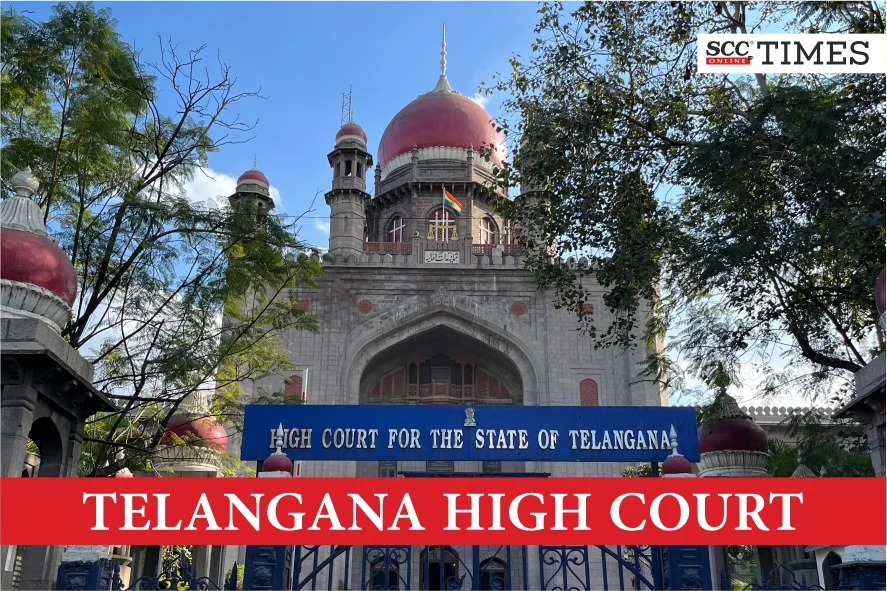Telangana High Court: The writ petition was filed by the petitioners seeking to issue an appropriate order or direction more particularly one in the nature of Writ of Mandamus, declaring the action of Respondents 1 to 5, in not registering the FIR based on the complaint made by the petitioner on 01-05-2024, 04-05-2024, representation dated 02-05-2024 received on 03-05-2024; in not registering the crime against Respondent 6, Chief Minister of Telangana and not taking any action against him as illegal, arbitrary, and against the principles of natural justice and violation of Section 154 of the Criminal Procedure Code, 1973; Articles 14, 19, and 21 of Constitution and consequently direct the police to entertain the complaint and register the FIR against Respondent 6 and to investigate the same as per the provisions of law.
B. Vijaysen Reddy, J., stated that the documents produced made it clear that the alleged fake notice emanated from the Chief Warden, and it was preposterous to assume that the Chief Minister of the State would personally handle twitter for posting trivial and casual tweets. The Court held that the writ petition was misconceived and accordingly dismissed it.
Background
The boarders of Osmania University (‘the University’) protested about the shortage of water and electricity in the hostels and in response to the protests, the Chief Warden circulated a notice dated 18-03-2024 stating that since the University had decided summer vacation, the boarders of campus hostels and messes were informed that the hostels and messes would be closed w.e.f. 01-05-2024 to 31-05-2024 and due to the severe summer there was a shortage of water and electricity in the hostels and thus, the boarders were requested to co-operate in this regard.
Petitioners submitted that such a circular had become subject matter of serious debates among the students and political community exposing shortage of water and electricity in the city and the State. Respondent 6, to show that there was no water and electricity shortage, directed the Registrar of the University to issue show cause notice to the Chief Warden. Thereafter, the Registrar issued a show-cause notice to the Chief Warden calling upon him to explain for disseminating misleading information thereby causing unnecessary confusion among the University community.
Petitioners further submitted that after issuance of show-cause notice, Respondent 6 through his X (Twitter) account tweeted on 30-04-2024 that the University had declared summer vacation to the students and there was acute shortage of water and electricity in the University Hostels and Messes, therefore, the Messes would be closed w.e.f. 14-05-2023 and would be reopened on 05-06-2023. Petitioners stated that Respondent 6’s tweet led to the posting of various tweets among the student groups of the University bringing to the notice to other students the original notice dated 12-05-2023 issued by the Chief Warden.
One of the persons replied to the post of Respondent 6 stating that the alleged circular dated 12-05-2023 posted was not genuine and he circulated a copy of the original notice issued by the Chief Warden.
Petitioners also submitted that the circular tweeted by Respondent 6 on 30-04-2024 was prima facie fake and fabricated document which was intentionally posted to mislead the people of Telangana. However, the students had the knowledge of the original notice where the hostels and messes were closed because of summer vacation but not due to the reason of acute shortage of water and electricity. Hence, petitioners approached Respondent 5 and filed a complaint against Respondent 6.
Analysis, Law, and Decision
The Court noted that as per petitioners the Chief Minister was responsible for tweeting fake circular of closure of hostels and messes in the University due to acute shortage of water and electricity, whereas the Additional Advocate General submitted that the accused had fabricated the notice dated 12-05-2023 by omitting “the acute water and electricity shortage”.
The Court stated that the documents produced made it clear that the alleged fake notice emanated from the Chief Warden. Moreover, it was preposterous to assume that the Chief Minister of the State would personally handle twitter for posting trivial and casual tweets.
The Court thus opined that petitioners were not aggrieved persons, and no prima facie case was made out to direct the police officials to act on their complaints dated 01-05-2024 and 04-05-2024. The Court stated that as the case was already registered, it was for the Investigation Officer to find out which of the documents were genuine/fake one.
The Court held that the writ petition was misconceived and accordingly dismissed it. Further, the Court stated that petitioners were at liberty to invoke appropriate legal remedies available under the law.
[Chatari Dashrath v. State of Telangana, 2024 SCC OnLine TS 1478, Order dated 11-06-2024]
Advocates who appeared in this case :
For the Petitioners: M. Roopender, Counsel
For the Respondents: T. Rajinikanth Reddy, Additional Advocate General








